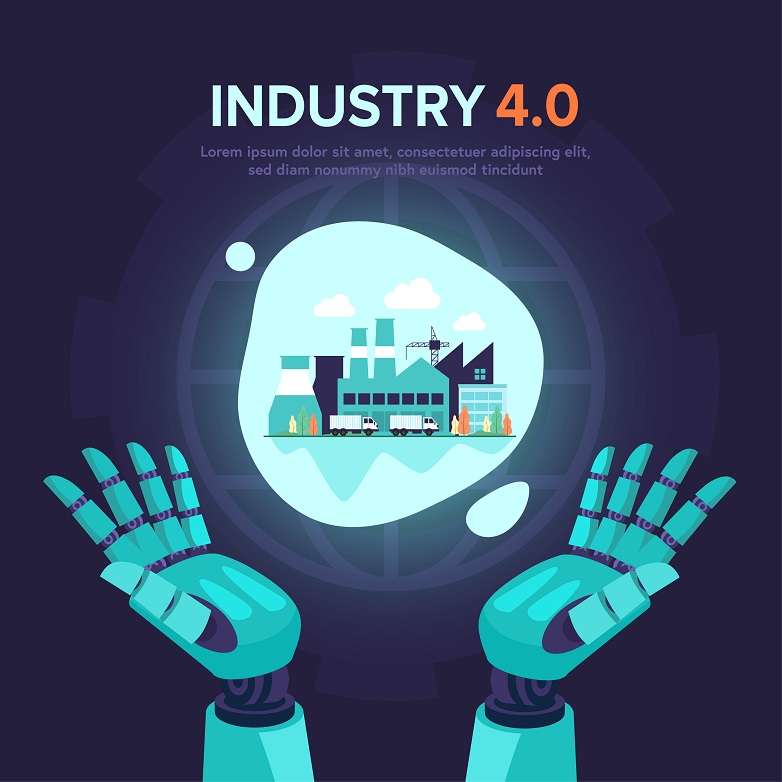The manufacturing industry is changing rapidly, and new technologies are making the process much faster and more proficient. Industry 4.0 technologies (IoT) like artificial intelligence and robotics aid in automating the production of products. This makes the process easier and helps in reducing costs and errors. Here, let’s explore the various benefits of Industry 4.0 technologies and how they’re revolutionizing the manufacturing process.
What is Industry 4.0?
Industry 4.0 the fourth industrial revolution, is a term used to state the incorporation of advanced technologies into manufacturing processes. The technology aims to produce smart factories that are well-organized, productive, and responsive to customer needs. By integrating the Internet of Things IoT, cyber-physical systems, cognitive technology, and cloud computing, manufacturers can easily improve the efficiency, productivity, and quality of their processes. With the help of IoT, the technologies can create a perfect process by eliminating unnecessary steps and making the equipment function in a well-organized structure. This new era of the industry will have a big impact on the way businesses operate in the future.
How Manufacturers Are Using Digital Transformation to Improve Operations
Digital transformation is changing the manufacturing industry by enabling companies to improve their operations and save money. With the help of digital technologies like AI, IoT, and data analytics, manufacturers can develop their operations and stay ahead of their competitors. Here are some examples:
- Smart Factories: With the help of IoT sensors, manufacturers can easily collect real-time data on the equipment’s functioning. These sensors help in detecting the changes in the quality and performance of the products. They evaluate the data to improve overall efficiency, enhance productivity and reduce downtime.
- Prognostic Maintenance: AI and machine learning algorithms help in deducting equipment failures beforehand. This allows them to keep the equipment running smoothly by repairing it before it breaks down, reducing disruption and increasing equipment lifetime. Every analysis made is based on the inputs and decisions provided by humans. Once it’s done, it easily automates all the manual tasks without any human input.
- Optimizing supply chain management: Manufacturers are using digital technologies to optimize their supply chains to manage the flow of goods more efficiently. Data analytics help to forecast demand and manage inventory levels. It helps manufacturers to stay ahead of stock levels and keep customers happy. Using blockchain helps in increasing transparency and security.
- Quality control: Digital technologies help in improving product quality control efficiently. This comprises using computer vision to detect defects and irregularities in the production line, as well as using AI to evaluate data on product performance to categorize areas for improvement. This helps to ensure that the products are of the highest quality, meeting the customer’s expectations.
- Enhanced customer experience: Digital tools like AI-powered tools and Chabot can easily enhance the customer experience by providing them with personalized service. Every set of products will have different algorithms and a unique sets of rules, making it easy for production. With the help of using data analytics, they can gain insights into customer behaviour and preferences.
Industry 4.0 Technologies
Industry 4.0 technologies are transforming the manufacturing industry in ways that are beneficial for both companies and customers. From automotive to health care, IoT can be used everywhere to improve the revenue of the business and streamline the process. By using industry-specific technologies, manufacturers can improve their efficiency and reach new heights of success. Here is detailed information on how different technologies play a major role in changing the way a business runs:
- Internet of Things (IoT): It refers to the network of connected devices, sensors, and machines that can in real-time collect and share data. In manufacturing, IoT helps to monitor equipment, optimize production processes, and reduce downtime.
- Artificial Intelligence (AI): Machine intelligence is the next step in human intelligence, and it has many benefits for businesses. AI is a powerful tool that can help humans do tasks that would otherwise be difficult or impossible. In manufacturing, it helps to reduce technical interruptions and improve quality control.
- Additive manufacturing: It is an innovative technology that allows designers and manufacturers to create products using layers of different materials to create incredibly complex shapes. It is also referred to as 3D printing. This process is used to create products that are difficult to create using traditional manufacturing methods.
- Augmented reality (AR): AR technology helps to overlay digital information onto the physical world. This is a powerful tool that can improve our lives in many ways. With the help of the Smartphone, it uses digital images to augment the user’s perception of the real world. By providing workers with real-time information about machines and processes, AR can improve efficiency and safety, allowing them to make better decisions and improve productivity.
- Robotics: Software or machines are used to perform tasks that usually require human intervention. Manufacturing can benefit enormously from the use of robotics and automation. These include increased efficiency, reduced costs, and increased safety. Robotics can help manufacturers achieve several goals.
- Big data analytics: Big data is a powerful tool that effortlessly gathers vital concepts from a large amount of data. This data can be used to enhance productivity, decrease waste and improve quality control.
These technologies help manufacturers evade major errors and gain new opportunities faster.
Impact of Industrial Revolution 4.0 on Manufacturing?
As the industrial revolution continues to grow and change, new manufacturing technologies are being introduced that will create new business opportunities and challenges for companies. The Industrial Revolution 4.0 has had a profound impact on the industry, changing it in ways that are both positive and negative. The fourth industrial revolution is changing the manufacturing industry in many ways, some of which are:
- Increased efficiency: Industry 4.0 technologies help in improving manufacturing efficiency. These technologies enable manufacturers to optimize production, which is having a big impact on the way they make products. This is attained through real-time data analysis, automated processes, and predictive maintenance.
- Improved flexibility: With market demands changing rapidly, these technologies help in quickly adapting to the changes. For example, AR and 3D printing allow the creation of customized products at a low cost in a short span.
- Safety: In manufacturing, IoT helps in automating dangerous tasks and providing the worker’s real-time updates on the functioning of the equipment and its process conditions. In this way, they can avoid mishaps and make better results.
- Reduced costs: Automation, robotics, and 3D printing can help reduce manufacturing costs by making it easier and more efficient to produce products. This can help to save money in the long run.
- Enhanced quality control: With IoT, workers can identify defects in the resources and products at the initial stage. This helps in improving product quality and reducing waste.
- Increased Innovation: Industry 4.0 technologies let manufacturers get real-time data on the performance of their machines and processes. This data can help them create better products and improve their existing ones.
Importance of Industry 4.0 technologies for the future
Industry 4.0 is a new way of doing business that brings big changes to the industry. Here are a few reasons why IoT is essential for the future:
- Digital Transformation: The manufacturing industry needs digital transformation, and Industry 4.0 is the perfect solution. This technology helps manufacturers incorporate digital technologies into their processes, allowing them to save money and make their work more proficient.
- Economic growth: Industry 4.0 can help increase productivity and create new jobs while also helping manufacturers innovate rapidly. This would result in increased economic growth.
- Global competitiveness: Industry 4.0 allows manufacturers to compete on a global scale more effectively. By using IoT, they can create high-quality products at a lower cost, which will make them more competitive in today’s marketplace.
- Sustainability: IoT offers significant opportunities for manufacturers to improve their environmental sustainability. With efficient production processes and by reducing waste, these companies can lessen their environmental impact.
- Flexibility: This helps manufacturers be better prepared for things like supply chain disruptions, pandemics, or natural disasters.
IoT easily helps a business create more products with less effort and more accuracy. IoT can help predict future disruptions, which can give businesses an edge over traditional manufacturing processes. It benefits businesses and customers by managing and analyzing real-time data remotely. By implementing new technologies, manufacturers can develop their productivity, eminence, security, and quality.
With IoT, the manufacturing industry can become more sustainable by reducing waste and improving productivity. Additionally, IoT can easily create new businesses and improve financial growth. Today’s market is driven by creative consumers, so manufacturers need to find ways to create more customizable and flexible manufacturing processes to keep up with their needs. Therefore, the future of the manufacturing industry needs to embrace these technologies. Industry 4.0 represents a fundamental change in the way we work and live, which is something that should be taken seriously.






